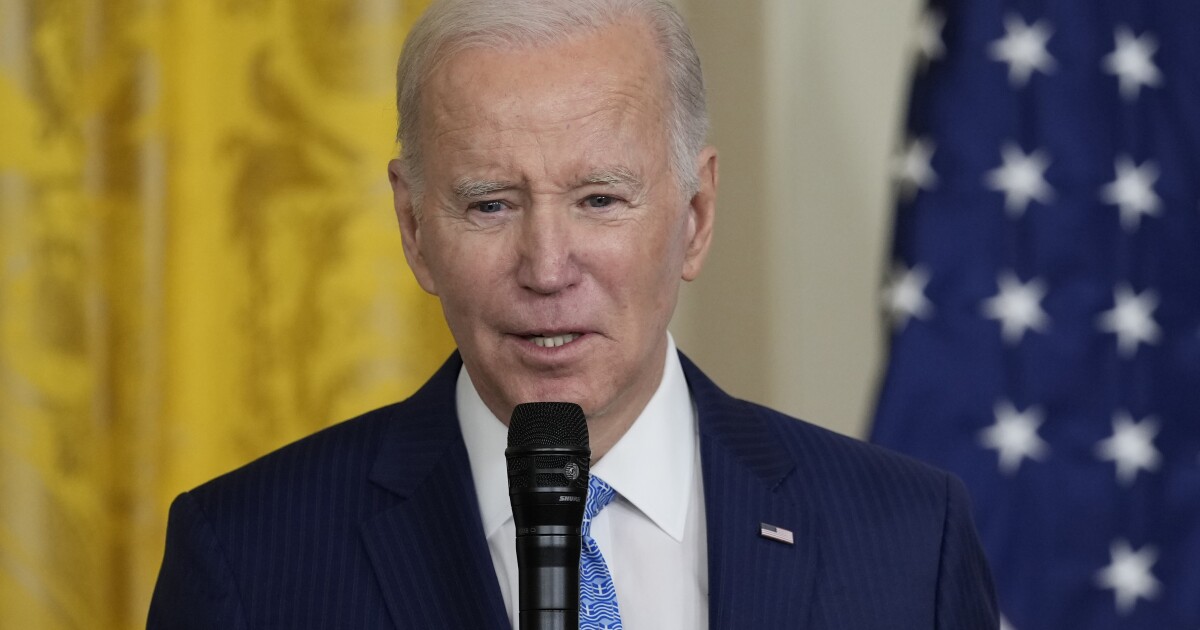

President Joe Biden is banking on congressional Republicans taking the brunt of the blame amid their standoff over the debt ceiling.
But as demonstrated by former President Barack Obama‘s debt ceiling fight with Republicans in 2011, lawmakers risk the country’s credit rating the longer they grapple with the problem.
BIDEN REVEALS WHICH STATES HE IS TARGETING IN SPENDING BLITZ — AND 2024
Biden is demanding Republicans propose a budget before he and House Speaker Kevin McCarthy (R-CA) meet to discuss the federal debt and debt ceiling while contending the GOP should increase the debt limit without preconditions. At the same time, McCarthy is adamant Republicans will not raise the debt ceiling without Biden agreeing to reduce the amount of debt.
As the two sides speak past one another, Republicans “are the only ones working to prevent a default right now,” according to Republican Study Committee spokeswoman Miranda Dabney.
“Any negative consequences will be the result of Biden’s refusal to engage with Republicans,” Dabney told the Washington Examiner. “Biden isn’t dealing with doormat Democrats anymore — he needs to face the reality that he lost the House and elections have consequences.”
The Republican Study Committee, chaired by Rep. Kevin Hern (R-OK), has underscored how McCarthy’s letter to Biden this week asking for a second debt ceiling meeting included many of the debt reduction measures put forward in the 176-member group’s “debt limit playbook” before it releases its budget mid-April.
“Republicans aren’t going to default on the debt — that’s not our goal,” Dabney said. “Our goal is to make essential fixes to the way Congress spends money before it’s too late. There has never been a better time to address this than in conjunction with a debt crisis. The vast majority of the Republican conference [is] thinking, ‘If not now, when?'”
The Republican Study Committee’s playbook represents a more centrist GOP approach to potential debt ceiling negotiations, in contrast to the House Freedom Caucus’s “woke, weaponized and wasteful spending” counterpart. The Main Street Caucus and Republican Governance Group are also influencing the process.
“The White House is clearly trying to run out the clock — that tactic endangers the entire global economy,” Main Street Caucus Chairman Dusty Johnson (R-SD) added. “We are $32 trillion in debt; our nation can’t continue down a path of fiscal insanity. Everyone needs to get realistic about the crisis we are facing and come to the table.”
Rep. Dan Kildee (D-MI), a House Budget Committee Democrat, countered that Republicans “should not be playing politics with the full faith and credit of the United States,” particularly since the debt ceiling “is about paying America’s bills and does not mean new spending.”
“Congress has dozens of times previously raised the debt limit, under both Republican and Democratic presidents,” he said. “Flirting with default, as the new Republican majority is doing, would mean an unnecessary financial crisis that hurts Michigan families and jeopardizes our economy.”
In the past, the public has blamed Republicans “for failures to compromise on fiscal matters and government shutdowns,” according to Northeastern University’s politics chairman, Costas Panagopoulos.
“Especially when there is a Democratic president and GOP control of at least one chamber in Congress,” Panagopoulos said.
The 2011 fight, for example, ended with Obama’s approval rating decreasing by almost 3 percentage points between July 15 and Aug. 10, according to FiveThirtyEight, and Congress’s by 5 points, per Gallup. Former Ohio GOP Rep. John Boehner was speaker at the time. That fight, while being resolved before a default, still led to the country’s S&P Global Rating being downgraded from AAA (outstanding) to AA+ (excellent).
Rutgers University history, journalism, and media studies professor David Greenberg agreed Congress “tends to suffer reputationally during budget standoffs.”
“We may be in a different era now with our intense polarization, and so it’s possible that no matter what either side argues, neither will move the needle of public opinion,” he said.
McCarthy requesting a meeting with Biden and conveying his negotiating principles will motivate the Republican base, according to Dan Schnur, the communications director of the late Arizona GOP Sen. John McCain‘s 2000 presidential campaign and founder of the University of Southern California-Los Angeles Times state poll.
“But at a certain point, they’re going to need to propose specific spending cuts, and that is going to cost them swing voters,” he said. “McCarthy is smart to outline those principles, though. It will allow him to claim a partial victory when the Biden-[Senate Minority Leader Mitch] McConnell [R-KY] deal ultimately happens.”
McCarthy asked Biden on Tuesday to “have your team reach out to mine by the end of the week to set a date for our next meeting.” The pair last sat down in February after the Treasury introduced extraordinary measures so it could pay the country’s debts after it reached its $31.4 trillion ceiling a month earlier.
McCarthy has suggested returning non-defense spending to pre-inflationary levels, restricting out-year growth, redirecting COVID-19 funds, and strengthening work requirements for those without dependents who can work.
In response, White House press secretary Karine Jean-Pierre repeated Biden would welcome “a separate conversation about our nation’s fiscal future,” but he hoped to have McCarthy’s budget first.
CLICK HERE TO READ MORE FROM THE WASHINGTON EXAMINER
“Business leaders and economists have warned that the threat of a default risks the livelihoods of American small businesses, retirees, and working families and would hand a massive win to China — and recent events underscore the need for Congress to address the debt limit as soon as possible,” Jean-Pierre wrote. “It’s time for Republicans to stop playing games, pass a clean debt ceiling bill, and quit threatening our economic recovery.”
“We have not seen anything from House Republicans,” she went on during Wednesday’s briefing. “What we have seen and heard are excuses after excuses after excuses. But they should be transparent to the American people. They should lay out what is it that they want to cut. How do they see moving forward in a fiscally responsible way?”







